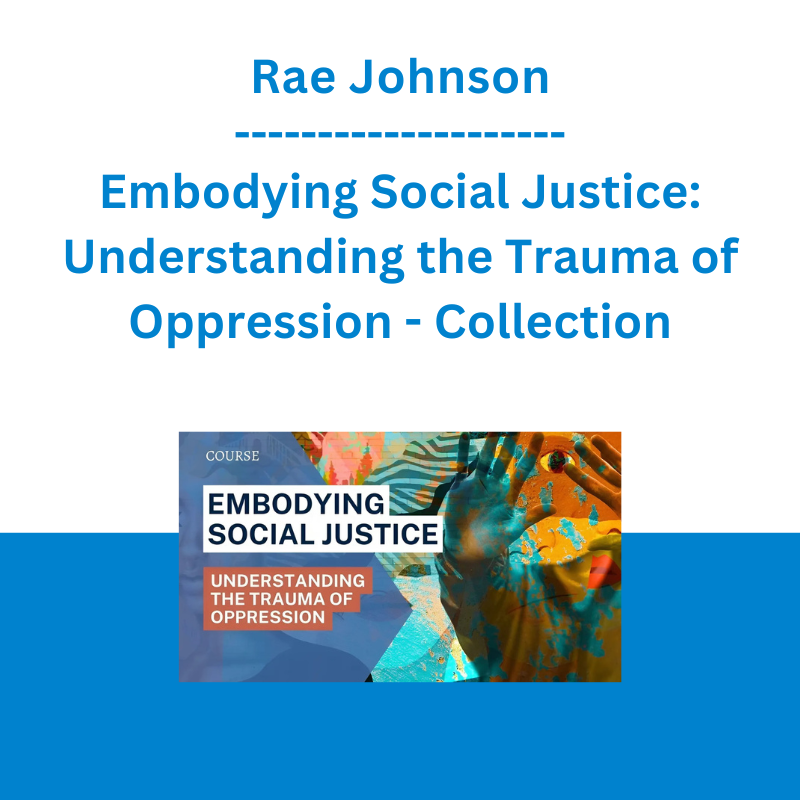*** Proof of Product ***
Exploring the Essential Features of “Rae Johnson – Embodying Social Justice: Understanding the Trauma of Oppression – Collection”
About
This course introduces an embodied approach to understanding and transforming entrenched patterns of relating to others based on inequitable social power dynamics. Grounded in current research, it offers a clear description of how oppression is experienced as a bodily ‘felt sense’ and identifies the mostly unconscious behaviors that perpetuate oppression. In particular, the course will address how embodied microaggressions contribute to the traumatic impact of oppression, how unexamined body norms can perpetuate body shame, and how privilege can be unconsciously embedded in everyday movements and postures.
Module 1: Oppression and Embodiment
This module introduces the topic of embodied social justice and articulates the conceptual framework and scholarly literature in which the course is grounded. Building the foundations for the model of embodied social justice presented later in the course, participants review findings from current research that position the body as key to the transformation of oppressive interpersonal interactions. Specific topics include embodied microaggressions, nonverbal communication, and oppression as a form of complex trauma.
Module 2: Body Stories
This session offers a series of case examples drawn from a qualitative study into the embodied experience of oppression. These ‘body stories’ illustrate how racism, classism, ableism and gender oppression are experienced in (and through) the body. Participants begin to examine their own body narratives and explore how their experiences of social power have shaped their bodies.
Module 3: Both Sides of Body Norms
It has been argued that the more marginalized and subordinated a social position we occupy, the more we are identified as bodies, and the more pressure we experience to modify those bodies to mitigate our deviance from the norm. In other words, one way to enact oppression against members of a particular social group is to characterize them as bodily objects rather than sentient subjects, and to simultaneously depict those bodies as crude, weak, or ugly. In this module we will unpack implicit body norms as a strategy for dismantling body shame and interrogating body privilege.
Module 4: Embodied Activism
The final session introduces an experiential model that privileges body knowledge (e.g., bodily sensation, body image, and nonverbal communication) in transforming problems of social justice. In addition to descriptions and illustrations of each phase of the cycle, suggestions are offered for using the cycle in a personal process of embodied activism.
Students who take this course will:
How implicit bias shows up on a body level
Strategies for undoing body shame and checking body privilege
Traumatic indicators of oppression – including somatic hypervigilance and dissociation
How asymmetrical nonverbal interactions can perpetuate inequity
The role of embodied microaggressions in everyday life
How posture, gesture, eye contact, and the use of space signal power differences
Strategies for enacting embodied activism and transforming the culture
Author
Rae Johnson
Dr. Rae Johnson, Ph.D., RSMT, is a scholar/activist and registered somatic movement therapist who chairs the Somatic Studies in Depth Psychology doctoral program at Pacifica Graduate Institute. The author of several books, including Elemental Movement, Knowing in our Bones, and Embodied Social Justice, Rae teaches and trains internationally on embodied activism, somatic research methods, and the poetic body.
Please see the full list of alternative group-buy courses available here: https://lunacourse.com/shop/










 Matthew Kratter - Trader University
Matthew Kratter - Trader University  SMB - Options Training
SMB - Options Training  Atlas API Training - API 570 Exam Prep Training Course
Atlas API Training - API 570 Exam Prep Training Course  Crypto Dan - The Crypto Investing Blueprint To Financial Freedom By 2025
Crypto Dan - The Crypto Investing Blueprint To Financial Freedom By 2025  Emanuele Bonanni - My Trading Way
Emanuele Bonanni - My Trading Way  Simpler Trading - Bruce Marshall - The Options Defense Course
Simpler Trading - Bruce Marshall - The Options Defense Course  Ed Ponsi - Forex Trading
Ed Ponsi - Forex Trading  Team NFT Money - Ultimate NFT Playbook
Team NFT Money - Ultimate NFT Playbook